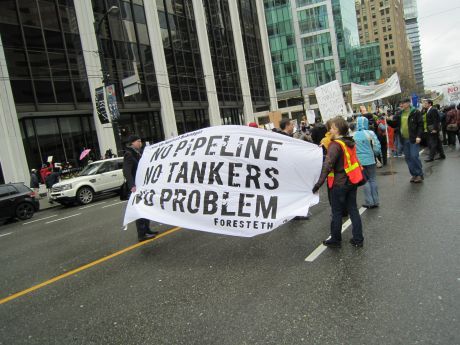News
You are here
Kinder Morgan: more pipelines, more resistance

July 1, 2013
Written June 12, 2013; updated July 1, 2013
Kinder Morgan wants to capitalize on the BC Liberal election victory by forcing through a pipeline expansion, but it can be stopped.
During the BC election the proposed Kinder-Morgan pipeline expansion became an important issue when the NDP announced they were opposed to the plan. There have been few details on the proposed pipeline which will expand the Trans Mountain pipeline to double in size and triple in capacity. The existing pipeline travels through residential neighbourhoods in Burnaby, Coquitlam and Surrey.
A few weeks after the election where the pipeline supporting Liberal party won, Kinder-Morgan has filed a project description with the National Energy Board (NEB). In an interview in the Globe and Mail, Kinder Morgan Canada president Ian Anderson, described the election outcome as, “pro-economy, jobs and investment in B.C.”
Kinder Morgan plans to invest about $5.4 billion to twin the pipeline as it attempts to cash in on the increased demand for the bitumen-rich Alberta tar sands oil on the world market. The expansion would include constructing 973km of new 36-inch pipeline segments, reactivating two buried but maintained segments, 11 pump stations and 21 storage tanks over the four terminals, and more.
Where the new pipeline segments will go remains a question, as Kinder Morgan has filed only a project description with the National Energy Board (NEB). Later in 2013 it will file a facilities application that will contain details about the route.
Since the pipeline was built in the 1950s, much of the area nearest to the pipeline in BC’s Lower Mainland has been built up with residences and businesses. Kinder Morgan has said that it plans to follow existing rights-of-way, which has led to fear that property may be expropriated.
There are also environmental concerns related to the extraction, transport and use of tar sands oil. In 2012, Vancouver and Burnaby announced opposition to the proposed expansion, as did the provincial NDP in the 2013 election. No one wants to see the region turning into an oil exporting port with the inherent risk of spills.
Several environmental and citizens groups such Burnaby Residents Opposing KinderMorgan Expansion (BROKE) are actively opposing the expansion, as is the Tsleil-Waututh Nation across whose traditional land the pipeline will cross and end. The Tsleil-Waututh are known as “People of the Inlet”, and have said that they have never ceded the land and they have not abdicated responsibility for it.
In April this year, Tsleil-Waututh Chief Maureen Thomas signed the International Treaty to Protect the Sacred from tar sands projects. The treaty was created by the Yankton Sioux and Pawnee Nations as they work to block development of the Keystone XL pipeline between Alberta and US Gulf Coast refineries. Locally, the Communications, Energy and Paperworkers Union along with the cities of Vancouver, Burnaby and West Vancouver support this treaty.
As the Kinder Morgan pipeline is an expansion project, it is not confirmed whether it would be a designated project under the Canadian Environmental Assessment Act (CEAA). Recognizing the potential opposition to the project, Kinder Morgan is requesting that the Trans Mountain pipeline be subject to environmental review under both the NEB Act and CEAA. Theoretically the proposal must also meet the BC Liberals “five conditions” for oil pipeline approval as they stand in their 2013 election platform.
The mass movement against the Enbridge Northen Gateway pipeline has forced the Liberals to sound as if they will stop it from being built. We need to keep building and expanding that movement to make sure neither pipeline project goes ahead, but we also need to fight for the creation of a green economy based on green jobs that will sustain our world for the future, not destroy it.
Update
In June there were two leaks from the existing Trans Mountain pipeline. Early in June There was a “small oil spill” of 12 barrels of crude oil – approximately 861 litres – was noted by maintenance workers checking sections of the Trans Mountain pipeline near Merritt, BC. The pipeline was immediately shut down so repairs could be completed and the soil cleaned up.
While this was the smallest oil spill of the 79 recorded spills along the Trans Mountain pipeline in its 60 year lifespan, a Kinder Morgan spokesman admitted that the public is becoming more skeptical and less forgiving about spills. This especially in light of its own Trans Mountain pipeline twinning proposal as well as Enbridge’s Northern Gateway pipeline that could move Alberta’s tar sands oil across remote areas of northern BC to Kitimat.
In the last few days of June another spill, this time just outside of Hope released between 20 and 25 barrels of oil spilled, or up to 4,000 litres.
Despite the relatively relatively low volume compared to what it could have been, these spills once again demonstrate that no oil company can guarantee 100 per cent spill-proof pipelines.
Section:
Topics:










